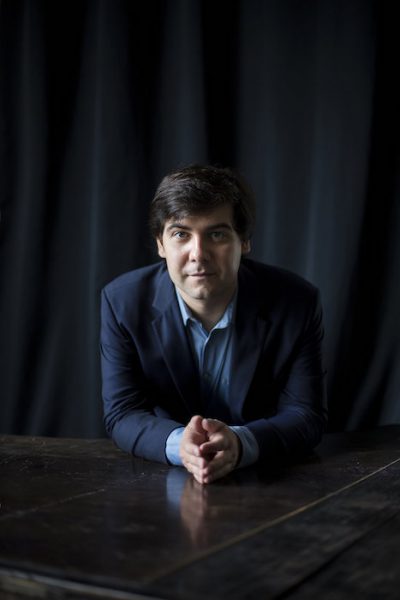Kholodenko offers mixed rewards at International Keyboard Festival

This summer’s International Keyboard Institute Festival—a combination of training sessions for student pianists and concerts by the Institute’s faculty—opened on Monday, and Thursday night featured a Masters Series Concert from Van Cliburn winner Vadym Kholodenko at Merkin Hall.
There were peaks and valleys to the evening, related to Kholodenko’s programming choices. A passionate musician with an inherent muscularity and weight to his touch, he plays the music of composers like Liszt and Tchaikovsky with great color, poetry, and verve, and there were some powerful examples of that during the concert.
But there were also some misfits and misfires, starting right at the beginning with Mozart’s Fantasia in C minor. It was clear Kholodenko admired K. 475 and appreciated its flights of fantasy and pianistic challenges. But he and the music seemed to talk past each other, sharing a common language but not appreciating each other’s idioms. The pianist’s use of dynamics, rubato, and the way he shaped phases sounded lugubrious, and he didn’t bring enough brightness to the warm, major key stretches to give the dark interpretatio he favored a feeling of satisfaction.
At his best Kholodenko exudes a sense of excitement that comes straight out of his personality, and the remainder of the first half—Beethoven’s Op. 126 Bagatelles and Op. 129 Capriccio—saw him as his best.
The Bagatelles sounded exceptionally spontaneous. No matter the tempo or tonality, Kholodenko seemed to be discovering each new note and idea, with every moment full of surprise while fulfilling the complex logic of late Beethoven. The slower Bagatelles, like the graceful G minor and the serene E-flat major, were deeply expressive, while the faster ones were thrilling. Pianist and composer sounded as one, the performance closer to an experience of absolute improvisation than one will ever find in the classical repertoire.
Kholodenko played the “Rage against a lost penny” Capriccio with such precipitous muscularity and high spirits that it could have been an encore.
The second half had the same variable quality. First was a set of Leopold Godowsky’s Studies on Chopin Etudes. One felt the choice had more to do with the Institute’s mission than aesthetic imperatives—these are pieces that demand and show off technique, and while they impress the listener with the pianist’s skills, for that same reason they are exhausting to listen to for extended periods.
And it was an exhausting set. Kholodenko began with the Op 10, No. 1—the original designation from Chopin—which Godowsky turned into an exercise in speed, articulation, and power. Kholodenko had plenty of each, but the extended duration, constant fortissimo, and the mass that the pianists applied quickly wearied the ear. Kholodenko played several of the left-hand adaptations, including No. 6 and No. 22, both in C-sharp minor, and his hand seemed to weary as well, showing some raggedness as the music progressed.
Kholodenko finished up in more comfortable territory, with Tchaikovsky’s posthumous student work, the (again) C-sharp minor Piano Sonata. Though it has an ungainly form, the sonata is also full of lovely, expressive music, and the Allegra viva scherzo is the source for the Scherzo movement in the composer’s Symphony No. 1.
As with the Bagatelles, the pianist showed a deep connection to the music, and the opening Allegro con fuoco was poised and involved, Kholodenko playing with conviction and purpose, his technique here used to say something.
His two quick encores (Scarlatti and Purcell) were, in this context, a surprise. These short, light contrapuntal pieces showed a delicate and wistful side to his artistry that was utterly charming.
The International Keyboard Institute Festival continues through July 27. Mao Fujita and Ann Schein play Friday in Lang Recital Hall at Hunter College. ikif.org